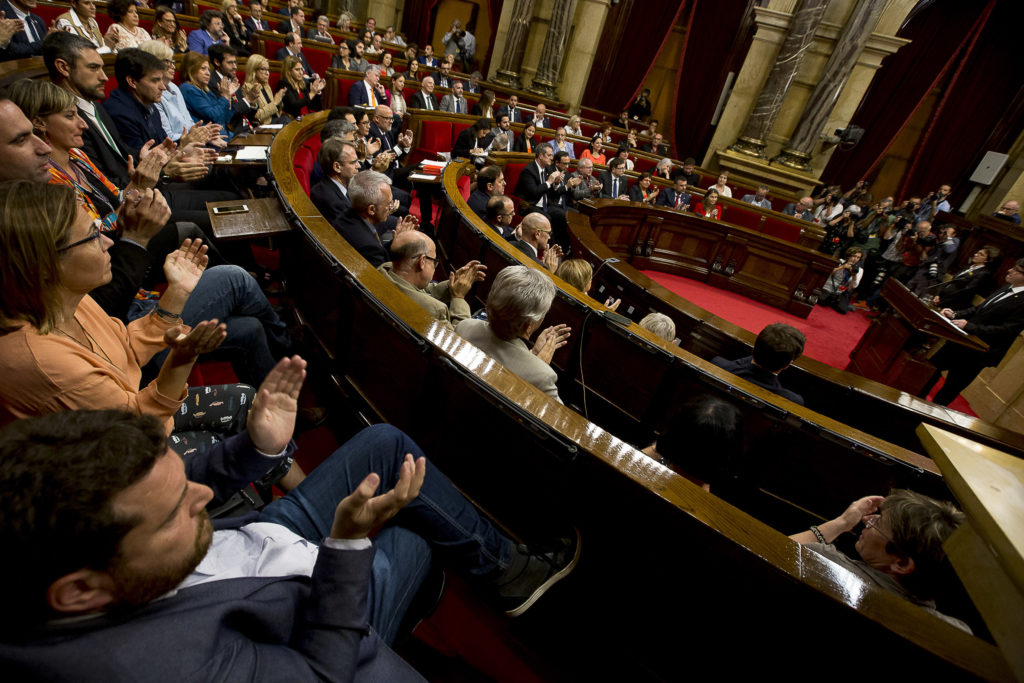11.10.2017 - 10:07
Yesterday at 19.37 and speaking before the Catalan Parliament, president Puigdemont declared independence in accordance with the people’s mandate arising from the October 1 referendum. But a minute later, the president himself announced his determination to put the consequences of the declaration on hold for a few weeks in order to permit international mediation. Eventually the declaration was signed, so the world has witnessed the birth of a new country.
In a few days all of us will be in a better position to judge the decision to immediately suspend the consequences of the declaration. Such a move surely aims to expose Spanish PM Mariano Rajoy before the international community and, therefore, we will only fully comprehend the extent of the decision taken —and whether a suspension was the most effective course of action— once we have seen the reaction of the Spanish government and the European institutions in the next few hours.
Slovenia made a similar decision and it worked out really well for them. But their case was not comparable to Catalonia’s, despite what some would have us believe for some reason or other. Mainly because when Slovenia agreed to a postponement it was already in full control of the country, the time limit of the decision was much more apparent and the negotiators were known to the general public. Slovenia’s hold on independence carried more weight because in Catalonia we do not know yet who the possible mediators will be and how they intend to go about their job.
Having said that, nobody should play down the importance of Donald Tusk’s address only one hour before the Catalan Parliament’s session was due to begin. Yesterday the president of the European Council went much further than Juncker and the European Commission have ever gone. He is brighter, has better information and his team is much better than Juncker’s.
So the Catalan way is not Slovenia’s but it might just work like it. In the coming hours —perhaps days, at most— we will find out whether Europe is prepared to stick its neck out for us or it merely wanted to avoid a declaration of independence at all costs. Parallel to that, we will see whether Spain will react violently or de-escalate the conflict. Slovenia chose to suspend its independence because it was keen to expose Serbia’s authoritarian stance for the world to see, persuaded that it would make it easier for them to join the international community. This might have a similar effect in Catalonia, provided that there is a shift in the position of the European institutions and Rajoy does what everyone expects him to. Otherwise, we will have missed an opportunity.
Yet politics is the art of making things possible and that is why political leaders sometimes find themselves in a tight spot. Yesterday Puigdemont deliberately chose to avoid delivering an epic moment. Given all the epic in the streets, in response to tyranny, it is no wonder that some have mixed feelings and are puzzled or even sad. However, as I had warned and explained on the previous day, no changes are ever felt on Day 1 after independence and only time provide the hindsight needed to fully comprehend the most difficult, historic decisions. Fortunately, I am certain that this will become apparent soon and that, as the CUP rightly pointed out, we will find out in no time.
PS: here is the current state of affairs in five simple bullet points
- The president of the European Council, Donald Tusk, asks Carles Puigdemont personally and publicly not to make a decision that can’t be undone and states that Catalonia and Spain must negotiate.
- Puigdemont declares independence, but suspends it. The whole world sees this as gesture that invites dialogue.
- Spain reacts violently.
- Puigdemont is entitled to appeal to Tusk. The Catalan president has kept his part of the bargain.
- Tusk must stop Rajoy, otherwise Puigdemont will no longer feel bound by their agreement.
Understood?


